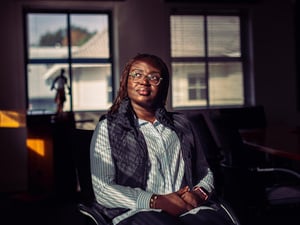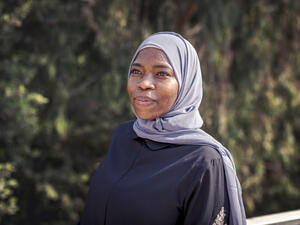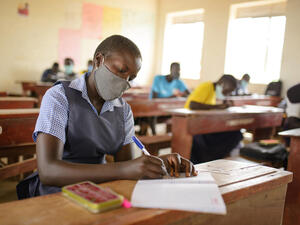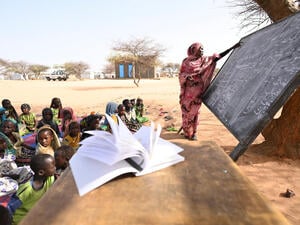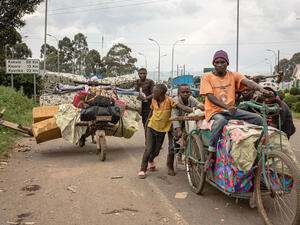Thirty years of hope and higher education for refugees in West Africa
Thirty years of hope and higher education for refugees in West Africa

Ornella Banam, a 30-year-old refugee from the Central African Republic, resumed her nutrition studies last year in Côte d'Ivoire thanks to a DAFI scholarship.
After surviving a brutal rebel assault on the church where she worshipped, Ornella Banam escaped the civil war in Central African Republic in 2014, fleeing to Burkina Faso. She managed to continue her studies there, hoping to become a nutritionist but, when her father died two years later, she could no longer afford the fees and had to drop out of college.
Last year, Banam was selected for the DAFI (Albert Einstein German Academic Refugee Initiative) scholarship programme, allowing her to return to higher education. “This scholarship gave me back the hope I had lost five years earlier,” says the 30-year-old. “I saw my dream shattered, but thanks to this opportunity, I am newly optimistic.”
The most recent figures show that refugee enrollment in tertiary education globally rose to 6 per cent in the academic year 2020-21. This represents a welcome increase from 1 per cent just a few years ago, but still falls well short of the target of 15 per cent higher education enrollment by 2030 set by UNHCR, the UN Refugee Agency, under its ‘15by30’ campaign. The figures reflect a pervasive inequality whereby refugees suffer enrolment rates that are – at every level of education: primary, secondary, and tertiary – lower than even the poorest sections of society.
The DAFI Tertiary Scholarship programme – funded principally by the German Government with support from Denmark, the Czech Republic, UNHCR, the UN Refugee Agency, and private donors – is crucial to achieving the 15by30 goal. It has enabled 21,500 refugees to enroll in higher education globally since 1992, including 6,200 in West Africa since 2010. This year, 934 young refugees won DAFI scholarships in 15 West African countries.
"This scholarship gave me back the hope I had lost..."
Like many others in the DAFI programme, Banam’s dream stems from her own experience, growing up in a country where poverty is rife and food often short. “Malnutrition is the leading cause of infant mortality in the world, particularly in my country,” she says, adding that she wants “to care for children suffering from malnutrition around the world”. With the DAFI scholarship covering the cost of her tuition fees, rent, and living expenses, Banam is, once again, able to devote herself to her studies.
Florine Lutumba was only eight years old when civil war forced her family to leave their home in the Democratic Republic of Congo and, for the last 15 years, she has lived in Côte d’Ivoire where she earned her baccalaureate at secondary school paving the way to the possibility of university education. But when her father’s ill health forced Lutumba to abandon her studies in order to help make ends meet.
"I was in a lot of pain because I could see my friends going to [university], continuing their education and getting ahead of me,” says Lutumba. “After a while, I decided not to lament anymore because it was only making me feel miserable.”
Having set her mind to it, she started working with her younger sister, baking and distributing pastries in her neighbourhood of the capital, Abidjan, eventually earning enough money to pay for evening classes in Business Administration at a private university.
Since 2021, DAFI has taken on the cost of Lutumba’s university tuition fees, freeing her to focus more closely on her studies. "Schooling is no longer a worry for me. Thanks to this scholarship, which covers my … fees, daily transport and medical expenses, I have a better life and I feel fulfilled.”
“My academic results are always very good,” she adds. “I always strive for excellence.”
Hard-working and dedicated, Lutumba, now 23, believes the difficult times refugees frequently have to overcome, “should be a motivation and not a source of discouragement”. Aiming to obtain her degree with flying colours, Lutumba has high hopes: “My ambition is to manage or lead a big company in the future.”
The impacts of a DAFI scholarship can be life-long, Mbabazi Mugemana, 45, has been a refugee since the 1994 Rwanda genocide. DAFI support ensured that the talented high school student was able to become a successful graduate and, in the two decades since, he has earned a master’s degree, forged a career as a teacher, educational consultant, and community leader, and is studying for a PhD.
“It is not only the scholarship,” Mugemana says, “we received training and coaching on how to be in life, in an enterprise, to look for jobs, everything.” Today, he remains involved in the programme that paved the way for his own success, acting as an observer on DAFI selection panels in Cameroon, where he lives.
The new scholars Mugemana sees joining the programme give him hope for the future of higher education among refugees: “I have seen that the importance of the DAFI scholarship to young refugees in Cameroon, is that they are well equipped to face their studies and their professional lives, without exception, everywhere they go.”
Reporting by Moussa Bougma in Burkina Faso, Lath Divia Kibangou in Cote d'Ivoire and Helen Ngoh Ada in Cameroon

